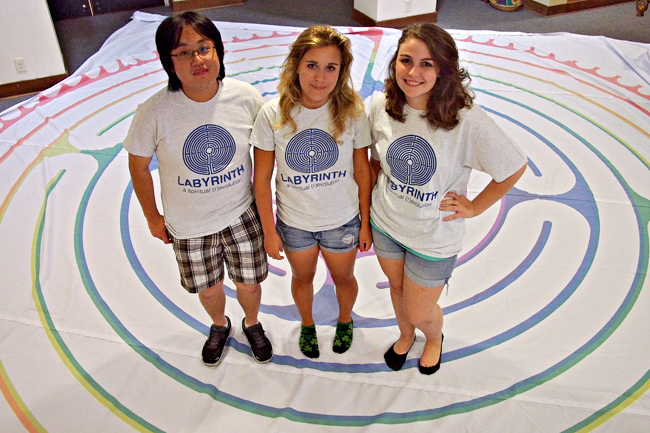When Amelia Fulbright started working as an associate pastor at University Baptist Church in Austin, she discovered that students were searching for a more inclusive ministry.
In turn, she formed the Labyrinth Progressive Student Ministry in August 2013. Labyrinth is a student-run Christian group that meets weekly at University Christian Church to meditate and explore spirituality.
“I thought it was really important to have a louder voice on campus that says, ‘That’s not the only way to be Christian,’” Fulbright said. “We believe in God and try to follow the teachings of Christ, but we actually believe that Jesus was all about liberating people from various forms of oppression.”
Labyrinth worshipped and worked with members of Jewish and Muslim student groups on campus in its first year. This year, the group plans to collaborate with Texas Secular Humanists, a nonreligious student group.
“We’re really LGBTQ-friendly — that’s one of our big things,” Fulbright said. “And we are Christian, so we’re coming from that perspective. Interfaith dialog is also really important to us.”
Labyrinth offers weekly meditation, which isn’t necessarily religious. Each week, the group tries different meditation techniques, allowing members to relate to their personal beliefs.
“When we use the image of the mountain, that’s usually something you can find across religious traditions,” Fulbright said. “And you can make it Christian, or, if you’re not particularly religious, you can just think about a mountain. I try to structure it so that you have a lot of options and that you trust your subconscious to find the image or the phrase that you really need the most.”
According to English sophomore Sara Asberry, vice president of Labyrinth, she uses this time to de-stress rather than to pray.
“It’s kind of different, person to person,” Asberry said. “A lot of people take it as a time to explore their faith and try to center themselves, but I just use it to take a break for the week.”
During the meditation sessions, students can walk along the group’s rainbow-colored labyrinth. According to Fulbright, they symbolically take all their worries and anxieties with them to the center, leaving them there, and journey out into their lives less burdened.
“In a labyrinth, there’s only one path, as opposed to a maze where you can get lost and you have to figure out the right way to go,” Fulbright said. “And, spiritually, the significance of that is, even when you feel like your life is twisting and turning, [if] you just keep going forward you’ll get to the right place in the end.”
For that reason, the group decided to name itself Labyrinth. Many of its members are able to explore their faith through meditation sessions, discussions and activities that help them navigate their own “labyrinths.”
“We felt like [the labyrinth] was a good metaphor, particularly for students,” Fulbright said. “When you’re asking questions and exploring different directions, it’s comforting to know that even when you feel lost, you’re not.”
Sarah Wildt, a student at Austin Presbyterian Theological Seminary, joined the group when it was formed and decided to become more involved this year. Beginning this fall as an intern, she plans to organize activities and guide discussions with students.
“For me, Labyrinth is everything I believe in an organization,” Wildt said. “Labyrinth is literally the epitome of what I believe in, and I never really saw myself that interested in college ministry before, but being here and taking on this role is because I’m so passionate about what we stand for.”















